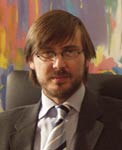 Dr Giovanni Scapagnini, MD, PhD
Dr Giovanni Scapagnini, MD, PhD
Assistant Professor, Institute of Neurological
Sciences, Italian National Research Council, Catania, Italy
Assistant Professor, Blanchette Rockefeller
Neurosciences Institute, West Virginia University, Rockville (MD),
USA
Visiting Professor, Institute of Human
Virology, University of Maryland, Baltimore (MD), USA
Dr. Scapagnini attended the University of Catania School
of Medicine and Surgery in Catania, Italy and graduated in 1992 with
a medical degree. He continued his education by obtaining a Ph.D. in
Neurobiology also from the University of Catania in 2000. Since completing
his education, Dr. Scapagnini has conducted research with the Institute
of Pharmacology School of Medicine associated with the University of
Catania and has worked as a Visiting Scientist with Department of Surgical
Research, Northwick Park Institute for Medical Research, Harrow, UK
in 1999, and with Laboratory of Adaptive Systems, National Institute
of Neurological Disorders and Stroke, National Institute of Health
in Bethesda, MD, USA in 2000. Dr. Scapagnini currently holds two academic
positions as Assistant Professor with the Institute of Neurological
Sciences, Italian National Research Council and with Blanchette Rockefeller
Neurosciences Institute, West Virginia University. He has recently
obtained a visiting professorship with the Institute of Human Virology,
University of Maryland, where he is in charge of a research project
on HIV dementia. He is also the scientific director of the “Research & Progress” foundation,
founded by Dr Robert C. Gallo. He is author of 35 indexed scientific
papers and several book chapters. His fields of research regard gene
expression profiles of cellular stress response and biology and molecular
mechanisms of brain aging and nerurodegenerative disorders. In particular
he has studied the anti-aging activities of several nutraceuticals
present in the Mediterranean diet.
2007 - Unveiling Nutri-Genomics (Sept. 13th Workshop)
Molecular Mechanisms of Longevity Regulation (Sept. 14th Lecture)
Ageing occurs mainly due to the failure of maintenance and repair pathways, and is a highly complex and individualistic phenomenon. Biological causes of ageing in a progressive failure of maintenance and repair, such as DNA repair, antioxidative capacity and responsiveness to stress. The consequences of a progressive failure of maintenance include increased vulnerability and probability of various diseases and eventual death.
One of the most prominent current theories of aging is the “free radical theory.” According to this theory, free radical molecules generated through mitochondrial metabolism can act as causative factor of abnormal function and cell death. Various toxins in the environment can injure mitochondrial enzymes, leading to increased generation of free radicals and oxidative stress, that over the life-span would eventually play a major role in aging. Free radical’s oxidative damage to key intracellular targets such as DNA or proteins has been shown to be a major cause of the degenerative diseases related to aging such as cancer and Alzheimer’s disease. Luckily, mammalian cells have developed highly protective systems against including oxidative challenges over time. When properly activated, each one of these cell systems has the possibility to restore cellular homeostasis and resume the ability to fight off oxidation. Activation of antioxidant pathways is particularly important for tissue with relatively weak antioxidant defenses, such as the brain. In fact, increasing evidence points to the notion that reduced cellular expression and activity of antioxidant proteins and the consequent oxidative stress are fundamental causes for brain aging processes and neurodegenerative diseases.
Since ageing in itself is not a disease for which one can be treated to achieve an “age-free” state, the focus of “anti-ageing” research has now shifted to finding ways of slowing down and preventing the failure of maintenance. Gene therapy, stem cells, and modulation through functional foods, nutriceuticals, cosmeceuticals and life style alterations are some of the possibilities of ageing modulation. In recent years there has been a growing interest, supported by a large number of experimental and epidemiological studies, about the beneficial effects of some commonly used food-derived products in preventing various age-related pathologic conditions. Spices and herbs often contain active phenolic substances endowed with potent antioxidative and chemopreventive properties. Curcumin, the pigment responsible for curry's characteristic yellow color, is a representative member of plant-derived polyphenols family, which also include resveratrol, caffeic acid phenethyl ester, ethyl ferulate, epigallocatechin gallate, and other tea phenols. All of these compounds appear to have a number of different molecular targets, impinging on several signalling pathways, and showing pleiotropic activity on cells and tissues. A possible general mechanism of polyphenols healing activity, relate to their ability to overexpress highly protective inducible genes, involved in the cellular stress response. Results from our and other groups identify new pharmacological strategies to increase cellular homeostatic mechanisms by activating multiple antioxidant defensive genes, a process that has also been referred to as programmed cell life.
Educational objectives of the oral presentation:
1 Overview the role of a group of early inducible genes, involved in the cellular stress response, such as the heat shock proteins and the detoxifying enzymes of type II, endowed with strong antioxidant and protective activities.
2 Give scientific strength to the concept that dietary chemicals, by modulating expression of target genes, can influence the balance between healthy and disease states, and potentially prevent degenerative age related diseases, such as neurodegenerative disorders.
3 Aging preventive strategy based on dietary agents is particularly attractive because of our long standing exposure to them, their relative lack of toxicity, and encouraging indications from epidemiology.